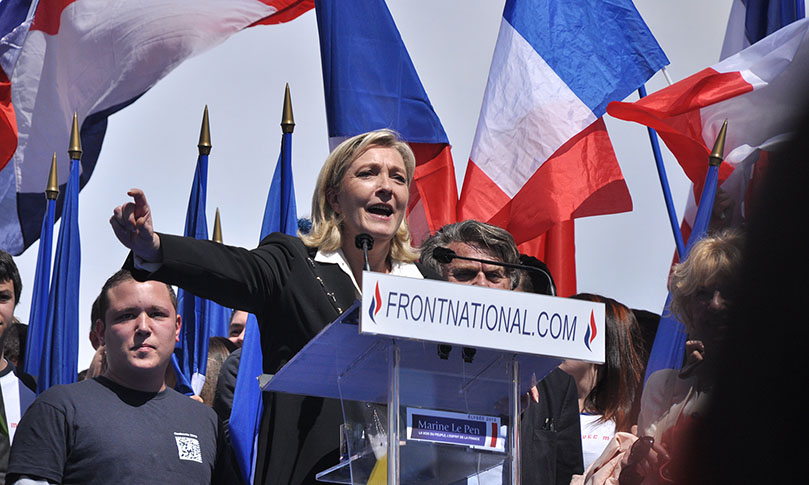
The French elections have been full of surprises: the disintegration of the ruling Socialist Party; the disgrace of François Fillon; the rise of candidates representing independent movements rather than established parties; and, most recently, the fact that a Communist-backed radical has a real chance of becoming France’s next president.
But the biggest and most enduring surprise has been that no one has seemed capable of imagining a second round without Marine Le Pen.
Before the campaign season even kicked off, most commentators seemed resigned to a Front National victory in the first round, making the second round a contest between Marine Le Pen and anyone else. As the elections approached, Le Pen seemed more and more inevitable. Her name dominated news of the election, giving the Front National a prominence unrelated to its modest political power.
A dose of tactical pragmatism was certainly warranted. Results from regional elections showed historic gains in the mass base of the Front National, moving what was once a fringe party into the mainstream. Le Pen, like Trump, showed an uncanny ability to shrug off personal scandal and capitalize on the economic distress of working-class French whites with her racist demagogy.
But tactics are never fully divorced from ideology. And somewhere, healthy pragmatism crossed the line into something that looks like concession—a failure of political imagination, or political will, a seat at the table saved for Marine Le Pen.
In France’s two-round electoral system, the first round is open to all candidates and the second round is a runoff between the top two. So why did Le Pen become a foregone conclusion so early?
Just as we saw with Donald Trump, evoking a Le Pen victory furnished the vicarious thrill of catastrophism (“Could she actually…? And what if she does…?”). Her presence in the political mainstream was a lucrative scandal for the media, which was mostly happy to spin the usual story about how “Europe” and “the institutions of the Republic” were threatened by “the rise of populism.” After all, this story had already been cut to shape and broken in during the 2005 referendum on the European Constitution, then deployed whenever.
By the time Jeremy Corbyn, in the UK, dared to suggest that the European Union has done little to help working people, the story of Europe vs. populism fit like the proverbial glove over the equally proverbial iron fist. To question Europe, to question austerity, was dangerous, irresponsible, utopian…
As long as the far right was in play, no challenge to neoliberal orthodoxy was permitted. An increasingly coercive pragmatism, in service to a European project dominated by finance capital, became the political order of the day.
The story of a binary choice—neoliberalism or fascism, the status quo or far-right populism—was an attractive one to anti-worker forces in France. For a pro-austerity centrist Emmanuel Macron, the threat of Le Pen was a distraction from his role in the disastrous Hollande-Valls administration. For François Fillon and the Republicans, it was a chance to make their curdled social conservatism and Le Pen-lite Islamophobia look fresh and respectable by comparison with the Front National.
And so the cry went up, before the first round was even underway: “Be realistic. Only Fillon can beat Le Pen.” And then, after Fillon’s fall from grace: “Be realistic. Only Macron can beat Le Pen.” And then, with the rise of Jean-Luc Mélenchon, calling for social and environmental justice: “Be realistic. He has no chance against Le Pen.”
(It was odd, indeed, to hear so many public figures say, “Anyone but Le Pen!” right up until Mélenchon had a chance at the second round. Then, a writer for The Economist proclaimed a Le Pen-Mélenchon matchup a nightmare. Apparently, the correct slogan is “Anyone but Le Pen or Mélenchon.”)
To their credit, some political forces resisted this restriction of political debate to a choice between centrist neoliberalism and far-right race-baiting. Benoît Hamon won the Socialist primary on an anti-austerity platform, only to find himself tainted by association with Hollande and Valls and trapped in a no-man’s-land between Mélenchon and Macron. Mélenchon’s France Insoumise [“Rebellious France”] movement began its meteoric rise after a mass rally for a new constitution and “a social and ecological Sixth Republic.”
The French Communist Party, whose members voted in the fall to support Mélenchon rather than running their own candidate, has been consistent in its call for left unity against both austerity and racism. As Communist MEP Patrick Le Hyaric points out, Mélenchon’s unexpected success shows that French voters are ready to “break the yoke” of the neoliberal status quo and search for “a new distribution of wealth, but also a new way of producing it.” In their GOTV efforts, PCF members have been reaching out to working class voters to remind them that the “useful vote” in the first round is the one that aligns with their interests, rather than the interests of the ruling class.
This election furnishes a lesson about finding the blurry line between pragmatism and defeatism, and about the danger of foregone conclusions, ready-to-wear stories, and giving up before the fight is done. Far-right danger is a tactical reality, but anti-worker forces have used the threat of Le Pen as an ideological bludgeon. So let’s hope for what we should have wanted all along—not to beat Le Pen in the second round, but to keep her from getting there.

 Join Now
Join Now